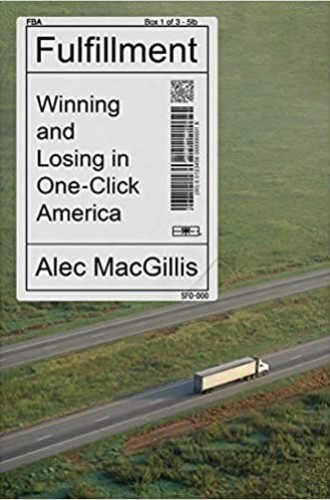How Amazon became the behemoth it was designed to be
Alec MacGillis’s history of the tech giant is long-form journalism at its best.
When Jeff Bezos, cofounder of Amazon, took a rocket into outer space recently, he held a press conference and thanked “every Amazon employee and every Amazon customer, because you guys paid for all of this.” He might also have thanked residents in towns and cities across the United States who have paid more for basic services such as electricity to offset Amazon’s consumption. Or the government officials who made deals behind closed doors to waive hundreds of millions of dollars in taxes (even as Amazon increased the use of public goods), accelerated the granting of building permits, and in some cases gave the company free land.
Fulfillment is long-form journalism at its best; reading the book feels like absorbing 10 or 20 years worth of well-written news articles and connecting the dots to show how the US economy got to this point. Alec MacGillis weaves together individual stories with economics, politics, and geography to show how Amazon exploited existing trends while injecting its way of doing business into various local places, “throwing the whole country off-kilter.”
Read our latest issue or browse back issues.
Despair in neglected areas led to overlapping manifestations: increasing poverty, stress on government services, and the opioid crisis. In metropolitan areas such as San Francisco, Seattle, and Washington, DC, the winner-take-all economy has benefited a few at the expense of most, as MacGillis shows. “So much of the country’s growth and prosperity had been clustered in so few places,” he writes, “that people in these successful cities, too, would be better off if more of that wealth and dynamism had spread to other cities and towns.”
One example of Amazon’s outsized influence was the public spectacle of its decision about where to place its second headquarters, with cities across the United States trying to outbid each other. When you see the numbers in a single paragraph of MacGillis’s book rather than spread out over various news articles, it’s astonishing what cities were willing to give away to lure the tech giant. Amazon ended up in Arlington, Virginia—close to the Federal Trade Commission and the Department of Justice, which the company would need to convince not to regulate its operations.
Among several brief histories in Fulfillment is one on lobbying, beginning with the first Congress in 1789 and leading to the “modern earmark” method of appropriating public funds for private industry. This is tucked into the narrative in a way that makes it easy to see how Amazon and its consultants—many of whom came out of government jobs to work for the tech company—play this political game so well.
At least since World War II, people from both major parties have rotated between the government, the biggest businesses, and the finance industry. In recent years, it has been easy for Amazon and other liberal-leaning tech companies to get high-level officials from the Democratic side, many of whom wanted to avoid “the stigma of Wall Street” after 2008–2009 and “the Obama administration’s failure to hold accountable the bankers most responsible for that collapse.” Between 2012 and 2018, Amazon’s lobbying efforts expanded until its lobbying office’s size exceeded that of any other tech firm. It even hired four former members of Congress.
Much of Amazon’s success comes from its model of using free delivery to generate huge traffic, which in turn draws its competitors to join Amazon Marketplace as third-party sellers. Amazon gathers data on those businesses and then undercuts them by selling nearly identical items under its own brand—all while charging them what amounts to a private tax.
Once the competition is vanquished, Amazon can pay lower wages. “The bigger Amazon got and the more it dominated local labor markets,” writes MacGillis, “the less competition it faced for workers, and the less it needed to pay to hire them.” High employee turnover prevents the kind of relationship-building that would allow workers to unionize, which has historically been the best way to win higher wages and safer working conditions.
One of the families whose lives Amazon crashed into are the Gandaras in El Paso, Texas. Teresa and Carlos Gandara started Pencil Cup Office Products in 2001 and built a reputation for above-and-beyond customer service. Amazon came knocking in 2017, encouraging Pencil Cup to sell through its online marketplace. But the company wanted a 15 percent cut, and Pencil Cup’s profit margin was 12 to 18 percent. There was a debate within the family.
Then Teresa Gandara attended a meeting of business owners and saw the data on Amazon. It had made $3 billion in sales in Illinois and Missouri in 2014 while having zero employees in those states. Nationwide, the company had only created about half as many jobs as it had eliminated by shutting down independent retailers. Fewer local businesses also means less local tax revenue. When Gandara went to local officials with this concern, she says she was told by a city manager that the local government “was not interested in protectionism for small business.” (The official remembers what he said differently.)
Undeterred, Gandara got an interview with a local television station and told viewers how money spent in a local economy remains there ten times longer than money spent with a retail giant such as Amazon. The reporter added research summarized from Harvard Business School detailing “Amazon’s penchant for seeing which products were selling most and then offering its own products to supplant them.”
Another piece of the puzzle that Fulfillment puts together is Bezos’s purchase of the Washington Post (where MacGillis previously worked) at a time when local newspapers across the country are in decline. “It was easier to make digital journalism work at a national rather than regional scale—you could be guaranteed a lot more clicks from all over the country for a story about some Washington drama than reporting in some midsize metro city or state capital,” MacGillis writes. Bezos himself has been a popular story, heralding the recent news about his rocket trip when describing his company Blue Origin in 2018 as “converting my Amazon winnings into space travel.”
Winning is a telling word to describe how Bezos sees what Amazon has done, eliminating competitors and amassing enormous wealth for him and a few others. One of MacGillis’s brief histories takes readers back to 1913, when robber-baron philanthropists such as Andrew Carnegie opposed the federal income tax instituted by the 16th Amendment. In his 1889 essay “The Gospel of Wealth,” Carnegie argues that men such as him know best how to give charitably from their collected profits, and they ought not be impeded by attempts to spread income out with higher wages for average workers or with income tax revenues allocated by the government. This antidemocratic notion has been woven into American ideas about wealth and philanthropy ever since, and Amazon has embodied it from the start.
It began with the company’s decision to start up in Seattle rather than California so that it would only have to charge sales tax on a small portion of its customers. This was allowed by a Supreme Court decision that required charging sales tax only in states where a company had physical stores or warehouses. “Plenty of other big corporations sought to minimize their tax bills,” MacGillis writes. “What set Amazon apart was the sheer multiplicity of ways in which it sought to do it, the way the impulse pervaded its behavior and decisions at every level.”
It’s easy to get mad at Bezos. But he’s really only the face of myriad decision makers at all levels of government who let him take advantage of money-making opportunities without concern for the effects. In the book’s conclusion, MacGillis argues for government to “break up the giants” and disperse wealth more broadly in the United States, “not evenly, by any means, but enough to restore some balance, to deter resentment and despair in one set of places and complacency and anxiety in the other.”
If antitrust action against Amazon is the best approach, do the rest of us have the political will to demand it?







